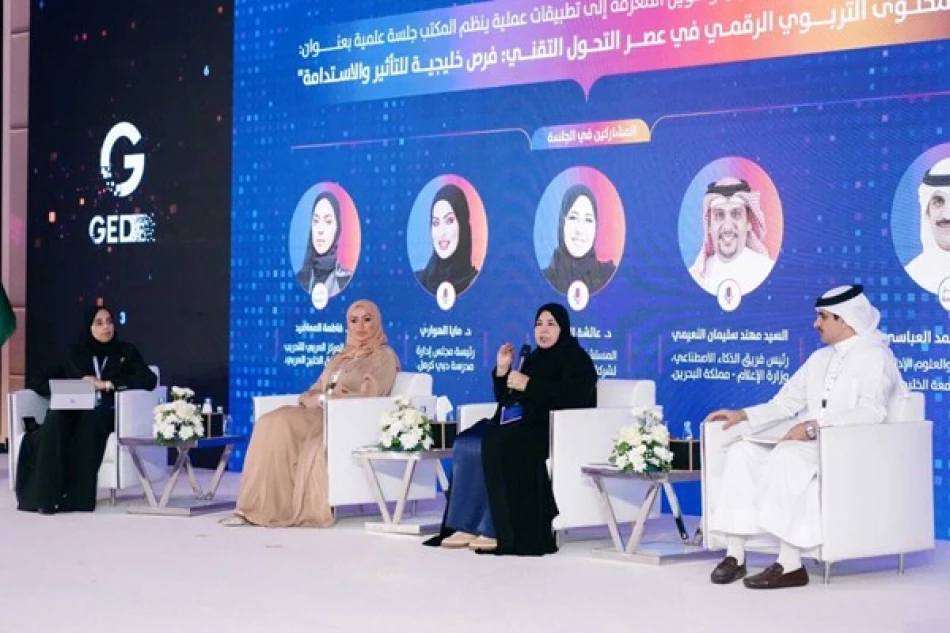
Digital Transformation Initiatives Showcased at Education Innovation Forum
Gulf States Accelerate Digital Education Transformation as Regional EdTech Leaders Unite
The Gulf Cooperation Council countries are positioning themselves at the forefront of a global digital education revolution, with UAE-based Alef Education leading collaborative efforts to develop AI-powered learning platforms that could reshape how millions of students across the region learn. This strategic push reflects a broader recognition that digital transformation in education has moved from optional to essential for maintaining global competitiveness.
Regional Collaboration Takes Center Stage
Qatar's Ministry of Education and Higher Education, in partnership with the Arab Bureau of Education for the Gulf States, hosted the "Educational Innovation Forum: Transforming Knowledge into Practical Applications," marking a significant milestone in Gulf educational cooperation. The forum brought together key stakeholders to address the urgent need for sustainable, innovative educational solutions across the region.
The event coincided with the second edition of the Gulf Educational Datathon competition, highlighting the growing emphasis on data-driven educational solutions. This dual focus on innovation and practical application signals a mature approach to educational technology adoption, moving beyond pilot programs toward scalable, region-wide implementation.
AI and Cultural Sensitivity: A Delicate Balance
Dr. Aisha Al Yamahi, Strategic Advisor at Alef Education, addressed a critical challenge facing global EdTech companies: how to leverage cutting-edge technology while respecting local cultural values. Her presentation on "Digital Educational Content Creation in the Era of Technical Transformation: Gulf Opportunities for Impact and Sustainability" outlined a framework that could become the blueprint for other regions facing similar challenges.
The company's approach integrates artificial intelligence, virtual reality, and interactive content while maintaining cultural authenticity—a strategy that differentiates Gulf EdTech initiatives from Western models that often struggle with cultural adaptation in diverse markets.
Economic Implications and Market Positioning
The Gulf's coordinated approach to educational technology represents more than pedagogical innovation; it's a strategic economic move. By developing indigenous EdTech capabilities, these nations are reducing dependence on foreign educational systems while creating exportable intellectual property. This mirrors successful technology localization strategies seen in countries like South Korea and Singapore.
The emphasis on sustainability and long-term impact suggests these investments are designed to create lasting competitive advantages rather than short-term technological upgrades. For international investors and EdTech companies, this signals a maturing market with clear growth trajectories and government backing.
Beyond Pilot Programs: Systemic Transformation
Qatar's Education Minister Lolwah bint Rashid Al Khater's direct engagement with Alef Education's latest solutions demonstrates high-level government commitment to digital transformation. This top-down support, combined with regional coordination through the Arab Bureau of Education, creates an environment where educational innovations can achieve scale rapidly.
The focus on "closing existing educational gaps" addresses a persistent challenge in Gulf education systems, where rapid population growth and diverse expatriate communities have created complex learning environments. AI-powered platforms that can personalize learning while maintaining cultural relevance offer practical solutions to these demographic realities.
Global Implications for Educational Technology
The Gulf's approach to educational digitization offers valuable lessons for other regions. By prioritizing cultural sensitivity alongside technological advancement, these nations are developing a sustainable model that could prove more resilient than purely technology-driven approaches seen elsewhere.
The emphasis on teacher empowerment rather than replacement also addresses a common concern in educational technology adoption. This balanced approach may accelerate acceptance and implementation, providing a template for other regions where teacher resistance has slowed digital transformation efforts.
As global education systems continue grappling with post-pandemic learning challenges, the Gulf's coordinated, culturally-aware approach to educational technology could emerge as a leading model for sustainable digital transformation in education.
Most Viewed News

 Layla Al Mansoori
Layla Al Mansoori






